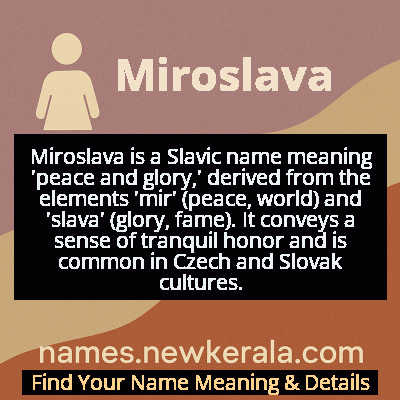Miroslava Name Meaning & Details
Origin, Popularity, Numerology Analysis & Name Meaning of Miroslava
Discover the origin, meaning, and cultural significance of the name MIROSLAVA. Delve into its historical roots and explore the lasting impact it has had on communities and traditions.
Name
Miroslava
Gender
Female
Origin
Czechoslovakian
Lucky Number
2
Meaning of the Name - Miroslava
Miroslava is a Slavic name meaning 'peace and glory,' derived from the elements 'mir' (peace, world) and 'slava' (glory, fame). It conveys a sense of tranquil honor and is common in Czech and Slovak cultures.
Miroslava - Complete Numerology Analysis
Your Numerology Number
Based on Pythagorean Numerology System
Ruling Planet
Moon
Positive Nature
Diplomatic, friendly, artistic, empathetic.
Negative Traits
Over-sensitive, moody, indecisive, prone to self-pity.
Lucky Colours
Green, cream, white.
Lucky Days
Monday.
Lucky Stones
Pearl, moonstone.
Harmony Numbers
1, 3, 4.
Best Suited Professions
Diplomats, mediators, caregivers, artists.
What People Like About You
Cooperative spirit, friendliness, artistic talent.
Famous People Named Miroslava
Miroslava Šafránková
Actress
Iconic role as Popelka in 'Three Wishes for Cinderella', one of Czech cinema's most beloved figures
Miroslava Němcová
Politician
Pioneering female political leader who served as Speaker of Czech Parliament during crucial EU accession period
Miroslava Vavrinec
Tennis Player
Represented Slovakia in international tennis, achieving professional success despite injury challenges
Miroslava Karpovich
Actress
Successful Russian actress known for bringing depth to contemporary Slavic female characters
Name Variations & International Equivalents
Click on blue names to explore their detailed meanings. Gray names with will be available soon.
Cultural & Historical Significance
Throughout Czechoslovak history, Miroslava has maintained its status as a name that connects modern bearers to ancient Slavic traditions. It appears frequently in folk tales, literature, and historical records as representing ideal feminine qualities—strength wrapped in gentleness, ambition tempered by wisdom. The name's persistence through various political regimes demonstrates its deep cultural roots and enduring appeal. Even during the Communist era when traditional names sometimes faced official discouragement, Miroslava remained popular as a subtle statement of cultural continuity and family tradition.
Extended Personality Analysis
Women named Miroslava typically exhibit a remarkable balance of serene composure and quiet determination. The peaceful 'mir' element of their name manifests as exceptional emotional intelligence, diplomatic skills, and the ability to maintain harmony in challenging situations. They are often the calm center in storms, providing stability and wise counsel to those around them. Their peaceful nature is not passive but actively constructive—they build bridges, mediate conflicts, and create environments where everyone can thrive.
The 'slava' or glory component gives Miroslavas a strong sense of purpose and quiet ambition. They pursue excellence not for personal acclaim but because they believe in doing things properly and making meaningful contributions. This combination makes them natural leaders who inspire loyalty rather than demand obedience. They typically possess deep loyalty to family and principles, demonstrating remarkable perseverance in defending what they value. Their strength is the steady, persistent kind that wears down obstacles through consistency rather than dramatic force.
Modern Usage & Popularity
In contemporary naming practices, Miroslava occupies an interesting space between traditional heritage name and modern classic. While it no longer ranks among the most popular names in Czech or Slovak birth registries, it maintains consistent usage particularly among families valuing cultural continuity. The name has evolved with the times through its shortened forms—Mira and Mirka have become popular as standalone names that work well internationally while preserving the original name's essence. Recent years have shown a mild resurgence as vintage names gain appeal among millennial parents seeking meaningful alternatives to trendy names. Outside Slavic communities, Miroslava appears occasionally in multicultural contexts where its beautiful meaning and melodic quality are appreciated. The name's usage patterns reflect broader trends in Central European naming—respect for tradition balanced with practical considerations about a name's functionality in global contexts.
Symbolic & Spiritual Meanings
Miroslava carries profound symbolic weight as a name representing the ideal balance between peaceful existence and meaningful achievement. Symbolically, it embodies the concept that true glory comes not from conquest or domination but from creating harmony and earning genuine respect. The name suggests the metaphorical image of a peaceful river that gradually carves canyons—representing how consistent, gentle strength can achieve monumental results over time. In Slavic symbolic tradition, the combination of peace and glory represents the highest form of success: one that benefits the community while maintaining personal integrity.
The name also connects to natural symbolism, particularly the olive branch (representing peace) and the oak tree (representing strength and glory) in Slavic folklore. Miroslava symbolizes the idea that internal peace is the foundation for external achievement, and that the most enduring accomplishments are those achieved through cooperation rather than conflict. This symbolic meaning makes the name particularly resonant in modern contexts where collaborative leadership and emotional intelligence are increasingly valued qualities in both personal and professional spheres.

